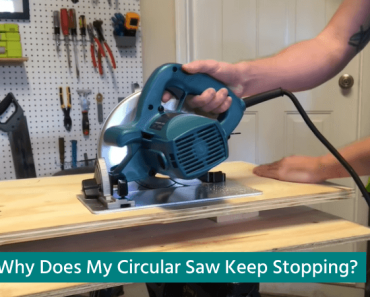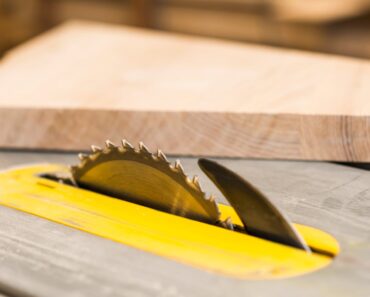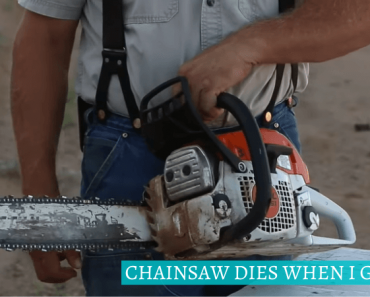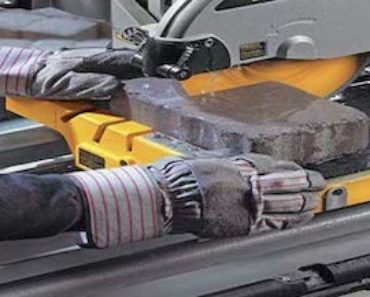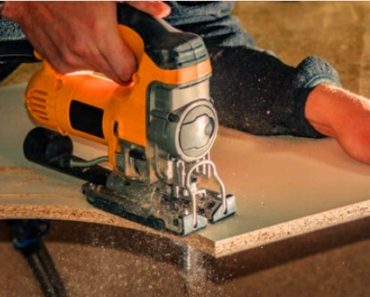When it comes to precise and easy cutting, there’s hardly any other tool that offers flexibility and precision like the chainsaw. But more often than not, users complain about oil leaking from their chainsaws. And as things stand, there are several easy solutions to the problem.
The best way to ensure no oil leakage is to properly store the chainsaw on the side or check for a secured fit on the oil cap. It’s normal for a chainsaw to leak up to 10 ml of oil every day. Anything more than that means there’s either an internal problem or issue with the storage.
Let’s explore all the possible storage options that ensure zero oil leakage from your chainsaw.
Table of Contents
Why Does My Chainsaw Leak Bar Oil When Stored?
It’s not uncommon to see chainsaw leak bar oil. While many people think this is some sort of mechanical problem, in reality, it isn’t. Bar oil leaking is mostly caused by the difference in air pressure and air build-up in the oil chamber.
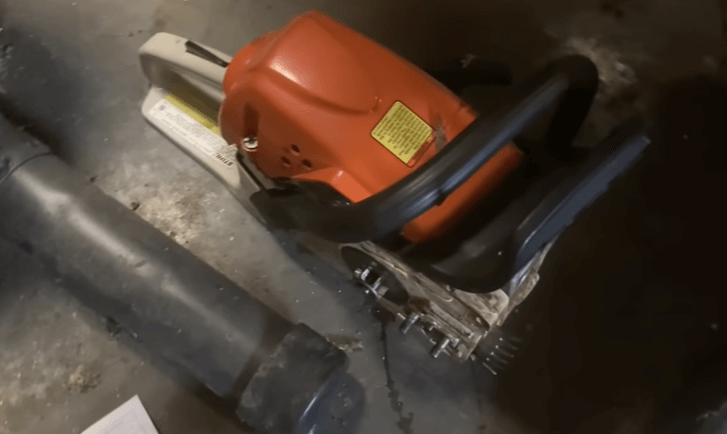
The guide bar is the primary method through which oil goes in and out of the tank. As oil gets pumped into the tank, so does air. If the chainsaw tank doesn’t have sufficient ventilation, it will create an air build-up and pressure deficit on the tank.
As a result, the tank will be unable to hold oil to its maximum capacity. The excess air pressure will also cause oil to leak out of the tank.
How To Store Chainsaw Without Oil Leaking?
There are several storage options based on the duration of the storage. You might store the chainsaw for a long time or short time. Let’s look at different options based on the duration.

1. Short Term Storage
If you’re planning to store the chainsaw for less than a month, or plan to use it every other week, then short term storage options will work best for you.
Short term storage requires several easy processes to ensure zero oil leak and to keep the equipment in performance ready condition. Keep the following in mind while storing.
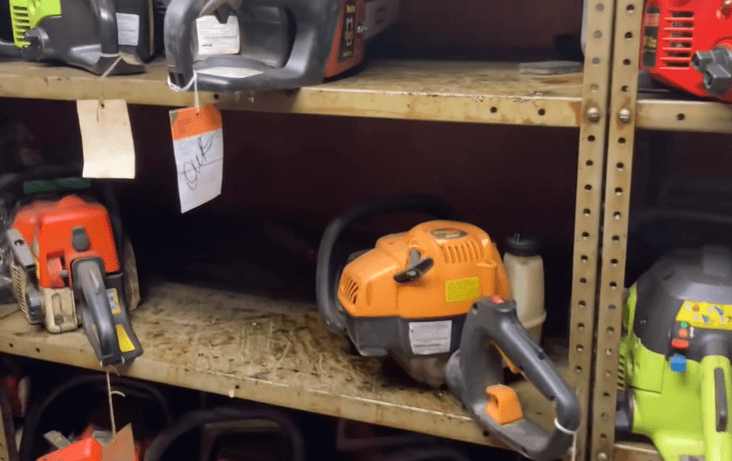
- Keep the chainsaw in a cool and dry climate. This is to ensure that the oil does not unnecessarily heat up.
- Use a protective covering to ensure no dust gets into the chambers
- Generously oil the chain
- Use silicon spray to protect against leak and debris
- Properly clean the chainsaw before storing
2. Long Term Storage
There are mainly three common storage options when it comes to long term storage. It’s going to be either vertical storage, rear handle or brake stop. And as you’ll see below brake stop is the most preferable option compared to the other two.
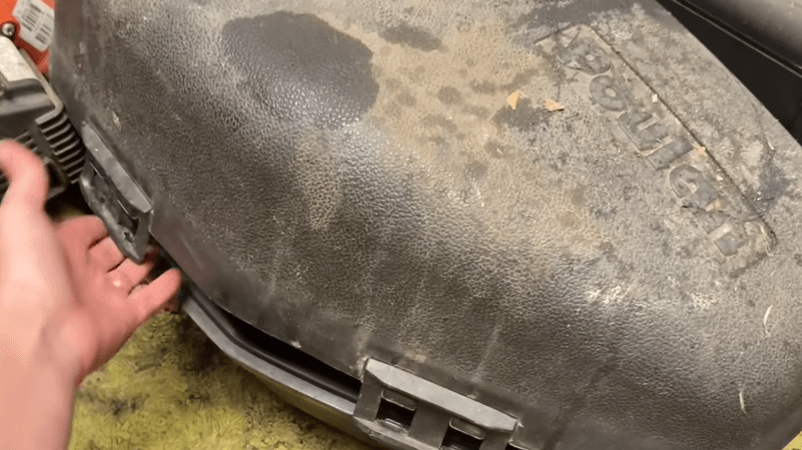
But here’s a pro tip, if you plan on storing either vertically or by the rear handle, make sure you completely drain the oil tank before doing so.
Vertical Storage
This is a common storage option for many people as it saves a lot of space. While it does save space, it causes oil to leak out through the bar, handle, and chain.
To avoid this problem, reconsider hanging the chainsaw vertically. If you must have to store vertically, you can simply remove all the oil from the chainsaw and store it. But if you plan on using it regularly, we suggest you burp out the chainsaw every now and then.
This will prevent air from building up in the tank and consequently prevent leakage.
Storing by the Rear Handle
If you store the chainsaw by the rear handle, it will create the same problem as the vertical storage. In this case, the leak will occur through the bar and the chain.
The same process of vertical storage applies to rear handle hanging as well. You can either drain out the oil and store it or make sure you burp out the chainsaw every now and then.
Storing by Brake Stop
This is the ideal position to store a chainsaw to ensure that it doesn’t leak in the long run. The brake stop essentially puts the chainsaw in a balanced position from where the oil stays secured in the tank.
However, there are caveats to this as well. The brake stop isn’t the most durable part of a chain saw. So it’s recommended that only small or medium-sized ones like the limbing chainsaw be stored in this way, not large ones.
For large chainsaws, you can easily follow any of the other two storage options.
What To Do To Prevent Chainsaw From Leaking Oil?
Now let’s move on to the all-important question, how do you prevent chainsaw from leaking oil? There are several ways to do it. Let’s cover all of them.
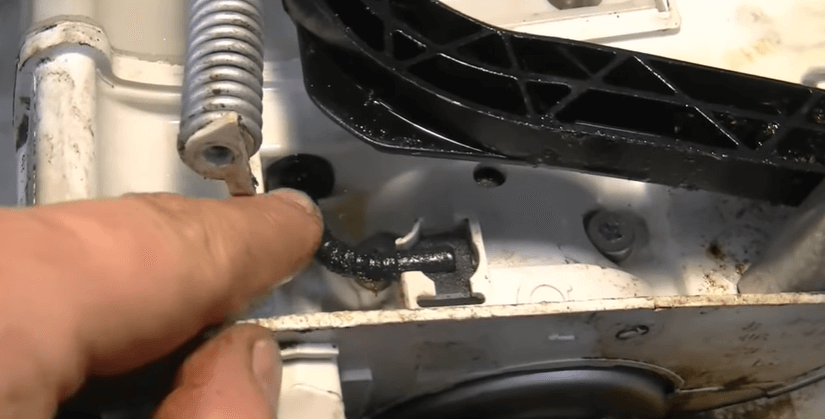
Check the Oil Level on the Tank Before Storing
Oil expands with the temperature change, this is basic physics. So if you fill the oil tank to the brim, chances are it will start leaking if there is a sudden increase in temperature. Every chainsaw oil tank has a distinctly marked maximum filling level.
Make sure you fill up to that mark or a bit below. If there is no marking, check for the maximum capacity from the manual and fill below that mark.
Securing the Plug
Every chainsaw oil tank uses either a plastic or rubber plug to secure the oil tank. Make sure you check whether they are tightly fit or not before storing them. The degeneration of rubber or plastic plugs over time is not unusual. If you don’t replace a deteriorating plug, it will eventually give up and cause an oil leak.
Replacing the plug is relatively easy and cheap. So make sure the plugs are in pristine condition before storing them.
Inspecting the Inner Body
Some users have complained that their chainsaw leaks oil from the body rather than the oil tank. This can be due to several internal component-related issues. If you’re sure that the oil is not leaking from the tank, then you have to check the tank vent, oil pump, and clutch outlets.
These are the parts that are connected to the oil tanks but aren’t usually sealed as oil only passes around these ports while in operation. However, while storing, oil might build up in these vents and cause it to seep into the internal components.
Make sure you clean them up and use proper sealings where applicable.
What To Do If Chainsaw Leaks Oil After Storing?
We’ve talked in detail about how to store your chainsaw so that it doesn’t leak oil. But there’s no guarantee that your chainsaw won’t leak one way or the other. Now let’s look at what you can do if your chainsaw starts leaking.
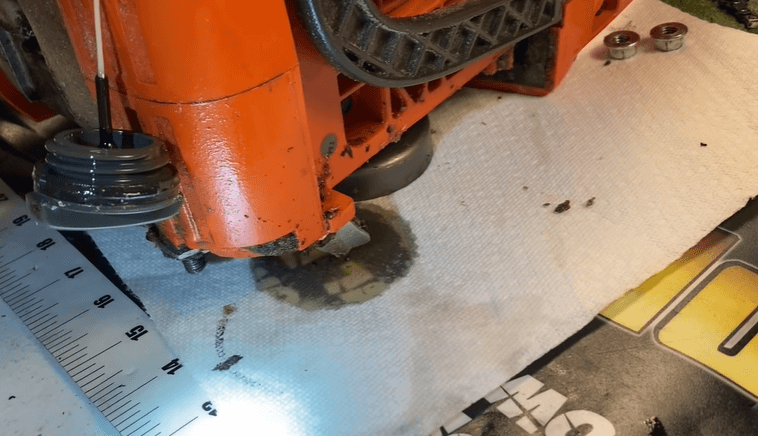
Change the oil Lines
Oil lines are the main source through which oil goes from the tank to the motor. If oil persistently leaks even after taking all the precautionary measures, chances are that the oil lines might be at fault.
Get them replaced or refurbished and check for any kind of leak in between.
Don’t Overfill
This one is more like the rule of thumb. If you overfill your tank, no matter what precautionary measures you might take, the oil will leak. If you see your chainsaw leaking oil, first check the level of oil in the tank. If it’s full to the brim, remove the excess oil.
And as a precautionary measure, do not overfill to begin with.
Clean the Outlets
We talked about different outlets like the bar tube, clutch outlet, and brake outlet. If you see oil leaking, it might be because one of these outlets might be clogged with dirt or residual oil.
In any case, try to keep these outlets in pristine condition to ensure the oil doesn’t leak in the future.
Tips For Successfully Storing Chainsaw Without Leaking Oil
It’s pretty difficult to store a chainsaw in a manner that it won’t leak oil. The problem is sometimes so severe that professionals simply suggest draining out the excess oil every time before storing it. In any case, here are some helpful tips and tricks to store the chainsaw without leaking oil.
- Always take out the chain from the chainsaw before storing
- Make sure to cover the chain up in absorbent material while storing
- Make sure there’s no debris or dust while reattaching the chain to the saw
- Store by the hand brake for a smaller duration
- Drain out the oil for long-haul storage
- Keep the chainsaw in a way that the bar remains horizontal to the ground
Frequently Asked Question
Now that you know all there is about the oil leaking issue, let’s look at some of the more commonly asked questions regarding the same.
Is it normal for my chainsaw to leak oil?
Yes, it is completely normal for a chainsaw to leak oil. It might be from the rotation of the chain or pressure deficit inside the tank. All in all, oil leaking doesn’t indicate any fault with the chainsaw and it is something that can easily be solved with some proper steps.
How much oil should a chainsaw leak?
A standard chainsaw should not leak more than 10 ml of oil. This should roughly be the size of a one-dime coin. Anything more than that might be an indicator of an active leak. In that case, you will need to follow the above-mentioned procedure.
Why is oil coming out of my chainsaw muffler?
If oil is coming out of the chainsaw muffler, it might be an indicator of a severe problem. The most common reason why oil might leak from the muffler is the use of incorrect oil, mixed oil, or stale fuel. In any case, such usage should be totally avoided.
Conclusion
It is not uncommon to see oil leaking from a chainsaw. Depending on the size and motor capabilities, the leakage might be anywhere between 10 to 20 ml per day. These are natural leakage from the brake oil to the chain oil.
But if the leakage is persistently high, it’s an indicator of oil tank leakage. There are several reasons why an oil tank might leak as we have mentioned above. The best approach to solve this issue is to take proper precautionary measures while storing the chainsaw.
Proper maintenance and precautionary measures are key ways to solve the oil leaking problem.


